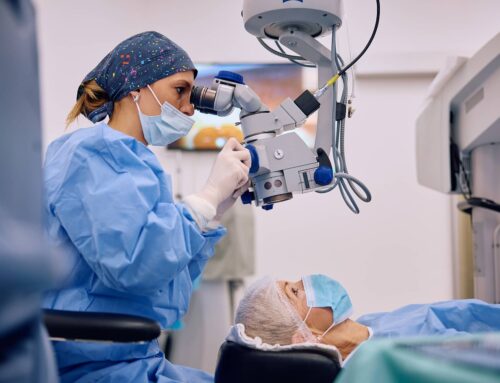Congratulations on your cataract surgery – you’ve taken a massive step towards regaining clear vision! Like many excited patients anticipating improved eyesight, you’re likely wondering, “What happens after cataract surgery, and how can I make sure I recover with the best possible vision?” At Best Cataract Surgeons, we want to see you recover confidently and smoothly, so we’ve created this cataract surgery post-op care guide to walk you through each step of the healing journey, providing essential tips on what you should do to care for yourself.
Cataract Surgery Post-Op Care Journey, Step By Step
Knowing what to anticipate immediately following your procedure in the days after can substantially ease any anxieties that you may have about what to expect and how to care for yourself.
Stage 1 – Immediate Post-Surgery Care in the First Few Hours.
In the first few hours after your surgery, your focus should be on rest and allowing your eyes to begin healing. It’s perfectly normal to feel drowsy from the sedation and your vision will be blurry at first, but both are temporary states that will gradually ease.
What You Should Do Right Away
- Keep your eye shield secure as it’s your primary defense against accidental rubbing or pressure on your eye right after your cataract surgery.
- If instructed, carefully administer your first dose of eye drops at home. These initial drops are a fundamental part of your cataract surgery post-op care regimen, as they boost healing, reduce inflammation, and prevent infections.
- Take prescribed pain relief medication if you feel discomfort or pain, as directed by your surgeon.
- Experiencing light sensitivity? Wear sunglasses, even indoors, to greatly enhance your comfort.
Please do not rub your eyes even if they feel itchy or irritated. Avoid strenuous physical exertion, swimming, getting in hot tubs, or applying makeup or lotions, as maintaining a clean, dry eye area will prevent infections. Stay away from dusty, smokey, or overly polluted environments as these can irritate your eyes and lead to infections.
Care Tip: Prepare a cozy resting area at home with dim lighting to facilitate relaxation during the first few days of your cataract surgery post-op care period. Keep extra eye shields and sunglasses around your house in easy-to-use locations (bedside table, entryway).
Step 2 – Early Home Nurturing – Days 1-3
As you settle into your home recovery, focus your attention on consistent cataract surgery post-op care practices that promote healing and prevent complications. During this time, expect blurry vision, mild scratchiness or grittiness, and light sensitivity sensations as your eye heals. Key effective home care actions include:
- Establish a consistent eye drop routine using your prescribed antibiotic and anti-inflammatory eye drops. Set reminders if you need to so you don’t miss a dose.
- Continue wearing your eye shield at night and sunglasses during the day, to reduce accidental rubbing, irritants, and uncomfortable light sensitivity.
- Embrace light activities around your home, but avoid straining your eyes or lifting heavy.
Care Tip: Always wash your hands before administering eye drops to prevent infection. Tilt your head back, gently pull down your lower eyelid to create a small pocket, and aim the drop into the pocket, avoiding touching the dropper tip to your eye or eyelashes.
Stage 3 – Week 1 – Monitoring Progress & Prepping For Your Follow-Up
Reaching the end of your first week of cataract surgery post-op care is a reassuring milestone, often accompanied by your first post-operative follow-up appointment. By this time, you should be feeling a lot better and noticing encouraging improvements in your vision, with remarkably reduced discomfort. Your next steps are:
- Continue using your prescribed eye drops until your follow-up appointment with your cataract surgeon; do not discontinue prematurely.
- Jot down any questions about your vision, recovery, or resuming activities, so you can get personalized advice from your cataract surgeon.
Pro-Tip: Keep a daily log of how your vision improves; this can be helpful during follow-up visits. It’s also a great way to personally appreciate and see the positive changes that your cataract surgery post-op care is having.
Stage 4 – Weeks 2-4 and Beyond – Embracing Improved Vision & Long-Term Eye Wellness
In the weeks following your first follow-up and beyond, your post-op cataract surgery care evolves into embracing your improved vision and focusing on your long-term eye health.
- Gradual Resumption of Activities. You’ll likely receive clearance to return to normal activities, including exercise and swimming.
- Ongoing Eye Care. Maintain healthy practices such as regular eye exams and a diet rich in nutrients beneficial for eye health.
Pro-Tip: Once cleared for swimming, always wear goggles to protect your eyes from irritants.
Listening To Your Body – When to Seek Reassurance?
While cataract surgery boasts an exceptional safety profile (97-98% success rates), rare complications during cataract post-op care can happen. Should you experience decreased vision, increased eye pain that’s not relieved by over-the-counter meds, persistent nausea or vomiting, new floaters or flashes of light, increased eye redness, or any eye discharge (watery or bloody), it’s best to err on the side of caution and seek out care from your cataract surgeon right away.
Ready for Lasting Clear Vision? Find Your Best Cataract Surgeon Today!
Your journey toward lasting, clear vision begins with effective post-operative care. By following these guidelines and working closely with a skilled and compassionate surgeon you can trust, you can ensure a smooth recovery. At Best Cataract Surgeons, we’re dedicated to connecting you with leading, warm, and understanding cataract surgeons in your area through our national directory. It’s time to find the best surgeon near you today.











